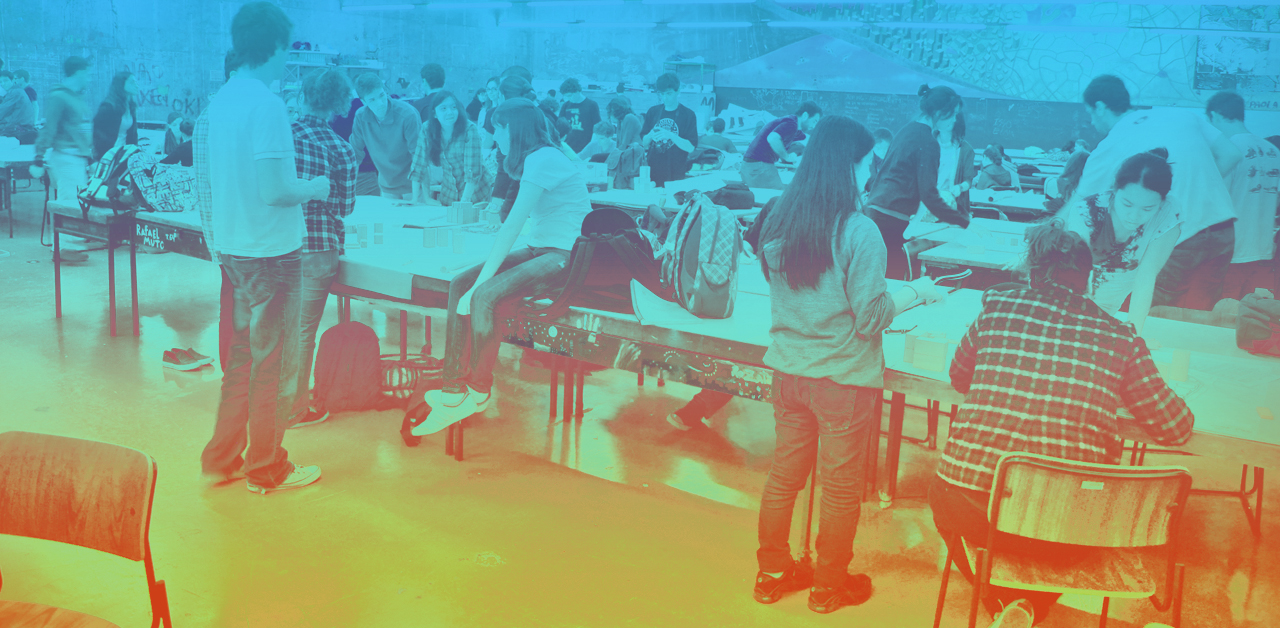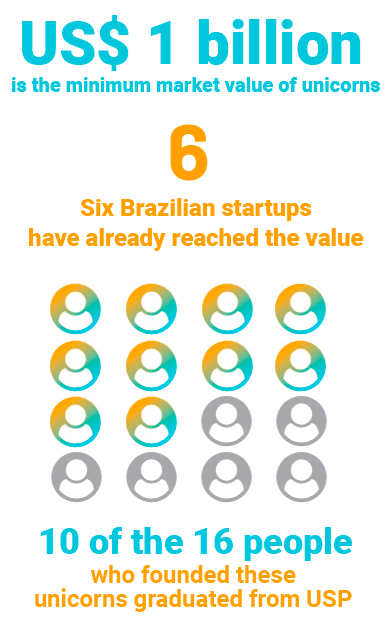

For those who are immersed in the world of entrepreneurship, the term “unicorn” is already an old acquaintance. That is how the startups valued at 1 billion dollars or more are called – when the concept was created, in 2013, these companies were still rare and there were less than 40 around the world. By March, the CB Insights platform counted 326. The unicorn is a mythological figure, but it has already become a reality in Brazil.
In February, a survey of the Distrito platform in partnership with KPMG pointed out that the country had six unicorn companies established: 99, Nubank, iFood, Gympass, Stone Pagamentos,and Arco Educação. Four of them have among their founders people graduated from USP.
How can a public university, which has as its pillars research, teaching, and action with the community, stimulate its students to create innovative products and services?
Jornal da USP has spoken with some of these unicorn creators and brings a summary of the initiatives that drive entrepreneurship among students.
Who are the creators of unicorns?
Credit card without annuity, transportation application, and online service for food delivery are innovations already present around the world and that, in Brazil, created opportunities for the emergence of billionaire startups.
All ten founders of these companies who made their training at USP were either from the Engineering or Administration areas. “But any person from any area can and should be entrepreneurs. All fields can benefit from innovation and heads thinking differently,” says one of the founders of 99.
Photo: Nubank Archive

“One of the things I always say about opening a business is: focus on solving a problem that exists. Some of the main features that entrepreneurs need are the ability to learn fast, adapt, understand the world around them, and pursue their goals, and this, undoubtedly, was something I started to develop when I was in college. Poli was a real school in this sense and really contributed for me to acquire a large part of these skills.”
Cristina Junqueira, cofounder of Nubank
 NUBANK
NUBANK
The only woman among the 16 founders of the Brazilian unicorn startups, Cristina Junqueira studied Production Engineering at the Polytechnic School (Poli) of USP.
Nubank operates in the area of financial services. It offers a credit card with no fees and unbureaucratic service, fully via application.
![]() GYMPASS
GYMPASS
Two of the three founders – Cesar Carvalho and João Thayro – studied at the School of Economics, Administration, and Accounting (FEA) of USP.
From a monthly or daily payment, Gympass gives access to several gyms – this way people can exercise wherever they want without having to enroll in two places.
![]()
IFOOD
All the founders studied at USP: Eduardo Baer and Felipe Ramos Fioravante studied Administration at FEA. Patrick Sigrist was a student at the Luiz de Queiroz School of Agriculture (ESALQ), and Guilherme Bonifácio studied Economics at FEA.
The company is an online food delivery marketplace.
![]() 99
99
The three founders – Ariel Lambrecht, Renato Freitas, and Paulo Veras – studied Mechatronic Engineering at Poli-USP.
This was the first Brazilian unicorn. Recently, 99 was acquired by a Chinese company. The transport application offers several categories of service and is present in over 1,000 cities.

“One hint is to engage in extracurricular activities and enjoy the holidays to study issues related to entrepreneurship. Also, anything that exercises your resilience is good: some sport or learning a musical instrument, for example. I had a discipline of entrepreneurship in my curriculum. It was pretty cool, and there are still few courses that have it. USP made me meet my partner, Ariel, with whom I founded three companies. This alone is worth the whole course.”
Renato Freitas, cofounder of 99
Why is USP a unicorn barn?
For two consecutive years, 2016 and 2017, USP was considered the most entrepreneurial university in Brazil. Disciplines and courses in the area, junior enterprises, scholarships for structuring new businesses, programming marathons, and business incubators are some examples of how the institution encourages its community to create and develop innovative ideas.
All this wrapped in a research environment, in which scientists are constantly seeking solutions – of every ten scientific studies produced in Brazil, two have at least one researcher from USP among the authors.
Portal Solus, created by the USP Innovation Agency (Auspin) in 2018, brings together the innovation and entrepreneurship initiatives of the entire university. Get to know some of them:
![]() ONLINE COURSES
ONLINE COURSES
At Coursera, the world’s largest online education platform, USP offers several courses in the fields of technology and business. One of them is Creating Startups: How to develop innovative businesses
![]()
DISCIPLINES
The university offers 153 undergraduate and graduate disciplines on these topics. Financial management, marketing fundamentals, innovation management, and digital entrepreneurship are some examples
![]()
INTERNATIONAL EXPERIENCE
With the entrepreneurship scholarship, the student can choose a project to develop activities related to entrepreneurship, innovation habitats, companies and research centers outside Brazil. In 2019, the program will grant R$ 1 million in aids
![]()
INNOVATIVE PROJECTS
In addition to scholarships, InovaGrad promotes the training of students for the structuring, development, and presentation of new businesses. In 2019, the first year of the program, over 70 projects by several USP units were approved. The total investment is of R$ 500 thousand

“Along with Auspin, we created InovaGrad, a program to stimulate innovation and entrepreneurship in undergraduate students. Students receive a scholarship to work on their projects and develop ideas and the final product (it may even be a startup), which will be evaluated at the end of the year. We have had dozens of projects approved this year and something to be emphasized is the integration between different areas – the proposals included several departments and units, something very positive.”
Edmund Chada Baracat, Graduation pro-rector of USP

“Here at USP, the student is exposed to ideas and solutions all the time. Unicorns are only the tip of the iceberg. If we graduated ten of the 16 founders, this is not chance, there is an entire environment that contributes. In addition, we are a research university and every researcher is an entrepreneur by nature, who proposes an innovation, a solution to something that no one has ever answered.”
Antonio Carlos Marques, coordinator of Auspin
Interaction with the entrepreneurial community
![]() ARENA SANTANDER
ARENA SANTANDER
Located within the campus Cidade Universitária, in São Paulo, the space hosts lectures and debates focused on the topics of entrepreneurship and innovation. It includes an auditorium in an arena format, rooms for reception and support, as well as the necessary technological infrastructure for presentations. The curatorship of the events is made by the USP Innovation Agency.
![]() HACKATHONS
HACKATHONS
Several entities at USP promote the so-called “hackathons,” events that bring together people with skills in programming, design, among others, to create technological solutions for a particular challenge. HackathonUSP is one of them – the latest edition of the marathon addressed the topic of technology to improve the financial sustainability of universities.
![]() JUNIOR ENTERPRISES
JUNIOR ENTERPRISES
Journalism, Speech-Language Pathology, and Veterinary Medicine are examples of USP courses that have a junior company. These student entities promote professional experience still during graduation. They are companies that provide advice and consultancy to external clients, besides conducting university events and other services related to the study areas of the courses or units.
![]() CENTERS
CENTERS
On several campuses, USP students have created entrepreneurship centers, which organize events, promote training, and offer support to those who want to start a business – in some cases, this support is offered even to those who do not attend the university. There are centers in São Paulo, Ribeirão Preto, São Carlos, and Lorena
Incubators and technology parks
With units in Ribeirão Preto and São Paulo, USP hosts venues that offer opportunities for those who want to start an enterprise. The technology parks Cietec and Supera help companies transform research and ideas into products, providing knowledge and infrastructure for them to develop. There are also incubators. They seek to shorten the steps that make up the path of entrepreneurs, from the emergence of the initial idea to the success of the enterprise.
236 companies
are incubated at USP, according to a survey by the USP Innovation Agency. In Ribeirão Preto, for example, over half of the companies of Supera were created by people who studied at USP.
CIETEC – São Paulo
The 104 companies incubated at the Center for Innovation, Entrepreneurship, and Technology (CIETEC) receive support in the areas of technology, business, fundraising, and investment
SUPERA – Ribeirão Preto
Altogether, there are 75 companies installed in the Supera Innovation and Technology Park: 54 of them in Supera Incubator; 15 in the Business Center; and six in the accelerator SEVNA Startup
ESALQTec – Piracicaba
Currently, ESALQTec Technological Incubator has over 70 companies, including resident, associate, and pre-incubation enterprises that develop projects related to agribusiness
HABITS – São Paulo
Located on the USP campus in the east zone of the city of São Paulo, Habits Incubator-School is oriented to entrepreneurship with a social focus. It promotes qualification and training
Social entrepreneurship
USP is also present at Enactus, a non-profit organization represented in several countries around the world. It aims to stimulate leadership and entrepreneurship in university students. Students idealize, develop, and implement projects based on business concepts to improve the lives of communities. The university has six Enactus teams in several units and campuses:
EEL, ESALQ, FEA-RP, FZEA, USP Cidade Universitária, USP São Carlos, and Law School
